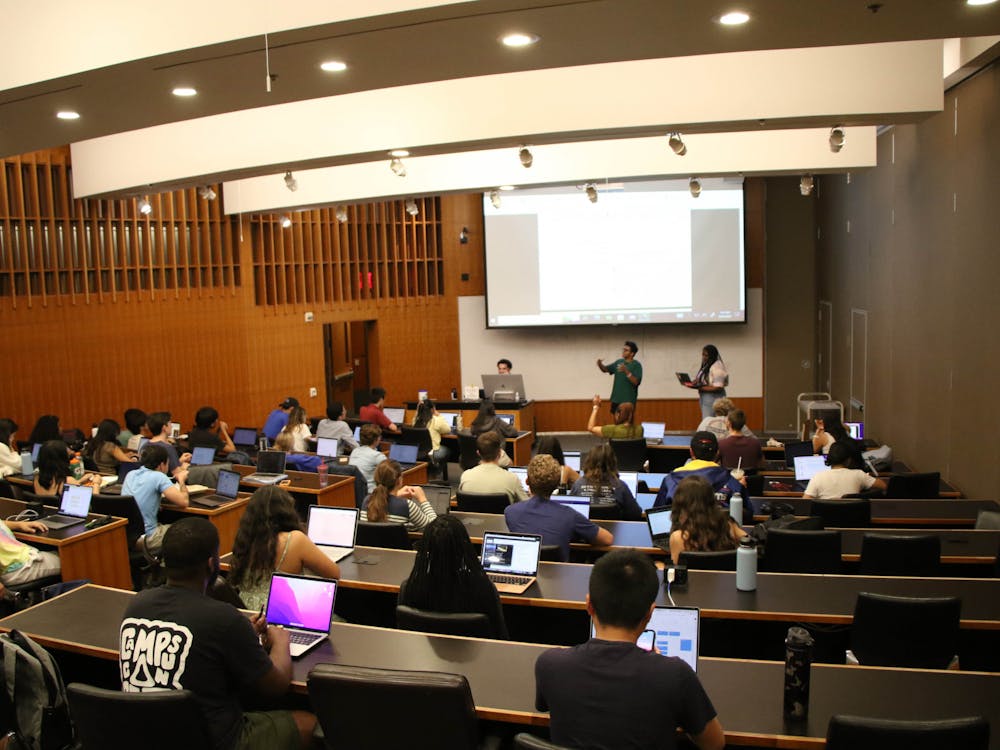Duke Student Government senators heard from Candis Watts Smith, interim vice provost for undergraduate education and associate professor of political science, about her vision for academic community and access to resources at their Wednesday meeting.
Smith is an associate professor of political science and the faculty director of the Mellon-Mays Undergraduate Fellowship. As a three-time Duke student herself, Smith said she has a unique perspective on the Duke experience that she brings to her experience in the Office of Undergraduate Education. Smith will serve in the role for 18 months as former Vice Provost Gary Bennett steps into his new role as dean of Trinity College.
She described her role to senators as “your chief academic advocate.”
“I’m focused on how we can foster intellectual communities, in our classrooms, but also outside of our classrooms,” said Smith, Trinity ‘06, A.M. ‘08, PhD ‘11. “I think a lot about equity, and that's partially because of my own research.”
Smith said one of her goals is to develop relationships and connections with leaders of other sections of the University, noting conversations she’s had with the vice provost for faculty advancement, Student Affairs and the Graduate School.
She also outlined the structure of the Office of Undergraduate Education, breaking it down into three offices of experiential education, intellectual community and student success. Experiential education includes the Global Education Office, the Office of Global Health and Safety, ACE student-athlete program and Duke Immerse. Intellectual community includes Bass Fellows, Faculty in Residence, Muser, QuadEx Faculty Fellows, university courses, DukeLIFE and the Office of Undergraduate Scholars and Fellows. Student success includes the Academic Advising Center, the Academic Resource Center, Academic Guides and the Testing Center.
Smith said that some areas she’s looking to improve are student advising models, “ways around learning how to learn, learning how to listen, learning how to reflect,” and streamlining the available resources for students.
“I left for a long time [and] now I’m back, and just the amount of resources is amazing. It’s like going to the cereal aisle,” Smith said. “How is it that we can make sure that you have an ease of access to these resources that’s use[ful and] that’s not overwhelming?”
Senators asked Smith how she sees the Duke educational experience changing in the next five years. She responded that she thinks the main driver of the changes will be Trinity’s revamped curriculum. The school is aiming to have a proposal completed by the end of spring 2023.
“How do we think more creatively around [the curriculum] ... and how do we maybe rethink some of our common sense around what must be,” she said, noting that the curriculum seeks to incorporate “elements of epistemic humility.”
When asked how she believes QuadEx will affect undergraduate education, Smith described the new residential housing model as “revolutionary.”
“It’s changing the way you work on many fronts,” Smith said. “It’s just an effort … to really think about ways to blur the line between where we live and where we learn.”
Smith also answered a question about how her work exploring race and racial attitudes informs her work in this new role. She spoke about Duke’s demographics, noting that when Duke began accepting its first Black undergraduates, it was not ready for their success.
“Our demographics are changing ... Duke wants to be a place that is accessible to more people across the socioeconomic spectrum. If it’s going to do that, I think we have to be prepared for students of any socioeconomic status to be ready, to have the tools that they need to be successful. We do that really well already. But if we want to increase that diversity, we’re going to have to increase those resources,” she said.
DSG Senate demographics
Executive Vice President Devan Desai, a senior, reported on a demographic survey of the DSG Senate, which received 60 responses out of 62 elected and at-large senators. According to the results of the survey, the senators are 39.0% first-years, 28.8% sophomores, 22.0% juniors, and 10.2% seniors. Roughly half of the senators are returning senators.
12.1% of senators identified as low-income and 8.8% as first-generation students. The majority of the senators that responded were public policy majors, at 27.1%, while 33.3% of senators considered themselves pre-law, 15.9% pre-business, 14.3% pre-health and 12.7% pre-graduate.
77.6% of respondents identified as straight, 8.6% as homosexual, 6.9% as bisexual and 6.9% as queer. 81% of the senators that responded identified as non disabled, 10.3% as having a physical disability, 6.9% as having a mental disability and 1.7% as having an intellectual disability.
In other business
The senators also approved $2797.38 for the All of the Above Showcase on Mar. 3, $2970.00 for Asian Student Association’s big/little ice skating event on Feb. 24, $5650.00 for Duke Arab Student Organization Concert on Mar. 7, and $4580.00 for Muslim Student Association’s spiritual workshop in Fayetteville.
DSG recognized Duke Operation Smile and Brain Injury Synapse and allocated an additional $3,000 to Duke Dhamaka.
Get The Chronicle straight to your inbox
Signup for our weekly newsletter. Cancel at any time.

Senou Kounouho is a Pratt sophomore and a university news editor of The Chronicle's 119th volume.

